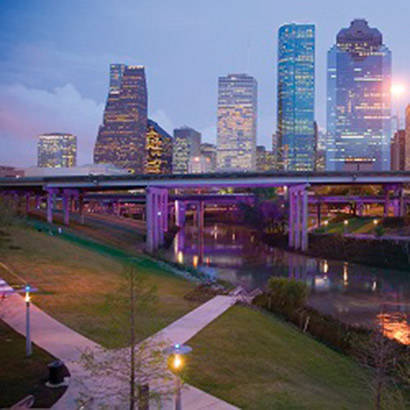
Most cities vie to be “first” in something, but when Corpus Christi, Texas was named the “Fattest City in the United States” in 2010 by Men’s Health Magazine, city leadership sought to quickly shed the pounds (and the title) by establishing a Mayor’s Fitness Council to promote healthier lifestyles.
While amenities are plentiful, including a beautiful marina and the Gulf waters, multiple barriers exist for accessing them. Existing hike and bike trails are in limited segments, separated by many miles of very busy streets. Texas has a strong “car culture” that does not consider bicycles a legitimate form of transportation and acts of harassment against bicyclists are common – consequently, many people in Corpus Christi perceive bicycling as “too dangerous.” A resident says “Moving around Nueces County in anything other than a motor vehicle is difficult.”
The Mayor’s Fitness Council (MFC) included representatives from Corpus Christi Parks and Recreation, a school district superintendent, a County health director, the city planning department, and others. As the MFC was discussing options to get Corpus Christi moving, a convergence of opportunities led them to the right path: Improving bike-ability and walkability. The Council was able to tie this goal into the regional visioning for the Coastal Bend to transform Corpus Christi into a more bike and pedestrian friendly and sustainable community. They were able to secure funding through the Bold Future Initiative and TARP (Troubled Asset Relief Program) funding for sustainable energy. In conjunction with the TARP energy assessment, the city decided to do a mobility assessment and included hike and bike priorities explicitly in TARP.
Initially, it was challenging to involve citizens in this effort because of the strong car culture. The MFC engaged the help of a local bike shop owner to generate interest in a non-motorized transportation plan. The bike shop owner became a community champion for the effort by helping to sponsor a town hall meeting, negotiating access to space, donating prizes to support the hike and bike plan effort, and disseminating information through his highly vested network of bicyclists.
At the town hall meeting, researchers demonstrated how Corpus Christi’s current sprawling, car-centric layout had a high cost to Corpus Christi in the form of current and future demand on utilities. Plans for new multi-use development and multi-modal transportation were presented to the public. Between the buzz generated by town hall meetings and other opportunities for citizen input, the City made an additional commitment to develop a hike and bike Master Plan by spring 2013.
This enthusiasm has spread to include public-private partnerships and volunteer opportunities to support expansion of existing trails and development of new trails. Next steps for the project include linking neighborhoods to schools and developing unused easements along drainage ditches for hike and bike trails. Creative thinking and engaging many types of stakeholders is helping to create a culture of walking and biking for Corpus Christi. As citizens, local businesses and local planning efforts converge, the momentum to impact the health of this community is picking up. A proposition that includes $1.5 Million for hike and bike trail development will be on the ballot for voter approval in November 2012.
